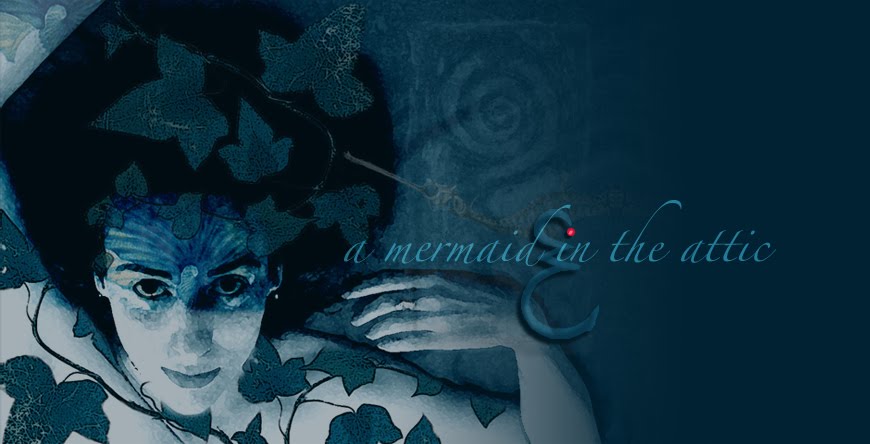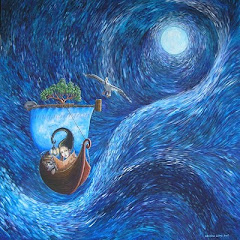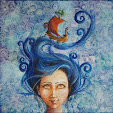But I started thinking about it, trying to pin down exactly what it was that really bothers me about frames. And it dawned on me. As long as the edge remains ragged or raw, as long as the lines aren't quite finished, as long as there is no clear cut boundary, the piece remains ALIVE. Dynamic, still full of potential. It's MAGIC; because it still has the ability to shapechange, any and all change is possible therefore all possibilities are contained within it, and the potential is limitless. As soon as you 'finish' it, sign it off, stick it behind glass, hide its rawness, hide those blurry edges where things are not so cut-and-dried, those liminal spaces where anything can happen...it dies. The magic is gone because all those possibilities have been dispensed with. It's the difference between a live tiger and a stuffed one. I suppose that might seem a little extreme and I'm not expecting everyone to agree with me, but I really think it's the reason why framing a piece bothers ME...it's like catching a butterfly and pinning it to a board. I think it's the reason why I find sketches more beautiful than finished paintings (look at Leonardo's sketches for example), why having the opportunity to peek at other artist's journals and sketchbooks is often far more interesting to me than seeing their finished work. I even feel this way about my own work, there is a kind of magic in the accidental sketches and unfinished scraps, in the journal scribbles, the working through an idea that is only half formed and still growing and changing and evolving. Some of my favourite pieces are odd, slightly unfinished and raw edged. Like these.

I've been fascinated with the notion of boundaries, liminal spaces, for so long. If you think about it, all the most interesting things, no matter whether it's art, science, social change, medicine or whatever, happen at the edges, away from the mainstream, the middle-of-the-road. It's often those who exist on the edges who give us a chance to see the truth more objectively. And of course, we're terrified of border places, where one thing bleeds into another, where you're not quite sure where one thing ends and the next begins, where we cannot categorise and box things up neatly. Where the line between 'me' and the 'other' whatever that might be, is blurred. Where things are slippery, the ground is shaky, and nothing is fixed. Think about every fairytale you've ever read, the most dangerous times are sunset, or midnight, or dawn, where it is neither day or night, neither morning nor evening, yet both. The water's edge is always filled with danger, the beach is sometimes sea and sometimes land, depending on the tide. When you stand waist deep in the sea, half of you is in another world where you could not survive for more than a couple of minutes without special breathing apparatus. That's kind of freaky if you think about it. Imagine how strange and terrifying it might be to someone who cannot swim at all, to be able to see to the bottom of a pond, yet not be able to get there...what if you dropped something precious? Lost forever and yet still tantalisingly visible.
I think this is an idea I'd like to explore more, use it in my work, now that I've worked out what it is that bothered me...see, it was lurking there on the periphery, on the edge, in that liminal space between awareness and knowing. It's always so much more comforting to be able to bring an idea in from the cold dark, and sit it in front of the fire with a hot cup of Milo. Then you can see what it is and how big it is. It's much less threatening that having it lurking outside in the night, just out of sight, running with the wolves somewhere between the first and last strokes of midnight!








8 comments:
What an inspired post! I LOVE journals more than the finished pieces. Opening a journal with the raw pages in front of you is like an opening into another world. I like my own journals to be 'novel sized' so they look like a story book even though each page is individual. Thanks Christina :o)
Thanks Jessie! I think it may be 'part one' of a series of posts, as the more I thought about it, the more light bulbs went off!
Christina, Your Work is wonderful and I love the natural look of the leaf on paper, on canvas... You have created some great textures here.
I like sketching on scraps of paper and sticking them into my sketchbook. You are right... Raw edges do look good, showing the fibers of the paper. Aging paper is fun too with coffee or tea!
Good to see you again at my place.:)
christina, love this thinking. I get it too, its the "being contained", finished, that does it for me, as soon as i start to work on a piece i think will be the actual one, my work takes on a stilted quality. All of my favourite works sit still in my sketch books and i ove the suprise of coming across them too. I am working hard right now on this very problem. Your piece of embroidery looks perfect with its unfinished edges. x
Yes. YES! I totally get that! Ironically in my own work I strive for the opposite ...ultra finished/polished... I never ever achieve it however! Simply because, like you, I am drawn to the UNpolished, the UNfinished. hmmm...I wonder what THAT's all about?!?
Anyway. Wanted to chime in, to say "hey!" (you joined in my OWOH and you're the only person I've subbed to so far) and your "Mermaid" piece makes me swoon.
So, "Hey!" :)
A lovely post; and I completely agree.
Thank you for these well wrought words, look forward to reading more of your musings on this theme & seeing your art exploring the betwixt & between.
Post a Comment